Authorities in Florida could offer no explanation Wednesday night as to why a former student armed with an AR-15 rifle opened fire at a high school earlier that day, killing at least 17 people.
Broward County Sheriff Scott Israel identified the gunman as Nikolas Cruz, 19, a former student at Marjory Stoneman Douglas High School in Parkland who had been expelled for "disciplinary reasons," but was currently enrolled in Broward County Public Schools.
Cruz, whose fellow students described him as "troubled," was arrested without incident in the nearby town of Coral Springs after the Valentine's Day rampage and taken to hospital with minor injuries, the sheriff said.
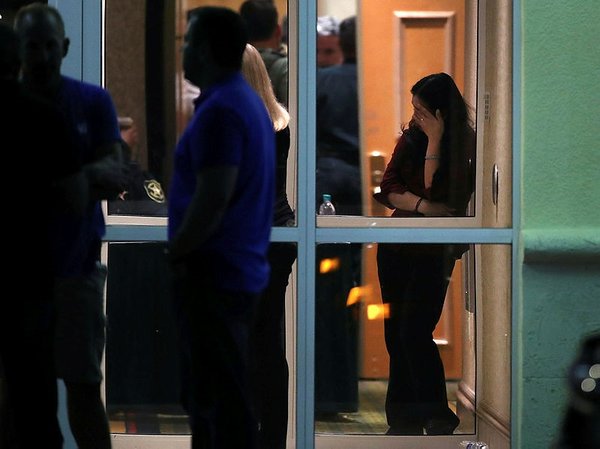
He had mixed in with students fleeing the school before being caught, officials said.
"We have already begun to dissect his websites and things on social media that he was on and some of the things... are very, very disturbing," Israel said.
"If a person is predisposed to commit such a horrific event by going to a school and shooting people ... there's not anybody or not a lot law enforcement can do about it."
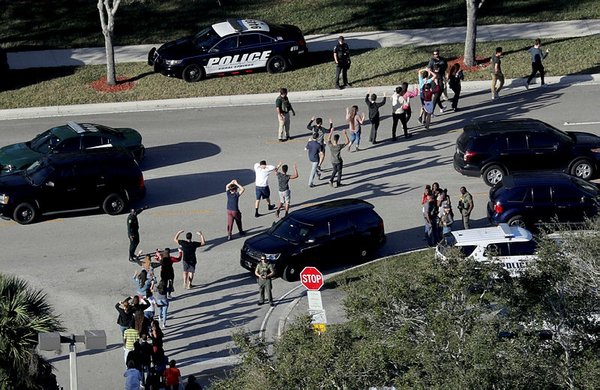
Israel said both students and adults had been killed, 12 of whom have now been identified.
Fifteen people were killed at the school itself and 17 were taken to hospital, two of whom died of their wounds, the sheriff's office said. One of those killed was a football coach, and one student injured was a deputy sheriff's son.
"This is a terrible day for Parkland," Israel said, speaking of the city of about 30,000 people, located 50 miles (80 kilometers) north of Miami.
A teacher at the school said Cruz had been identified previously as a potential threat to his classmates.
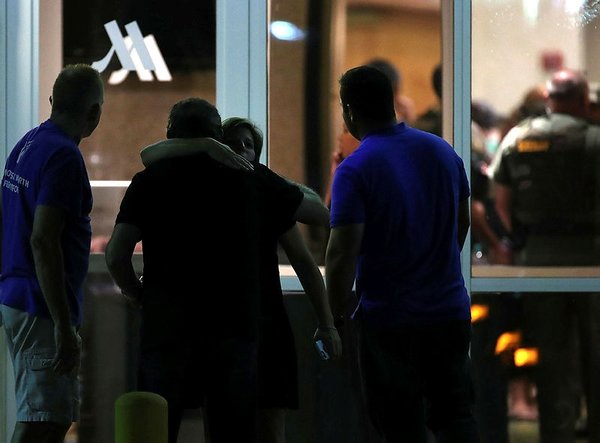
"We were told last year that he wasn't allowed on campus with a backpack on him," math teacher Jim Gard said in a Miami Herald interview.
"There were problems with him last year threatening students, and I guess he was asked to leave campus."
Cruz was also said to have been in the Junior ROTC (Reserve Officers' Training Corps) program while at school.
A law enforcement source told CBS News that the gunman pulled a fire alarm before opening fire, but Israel could not confirm that report.
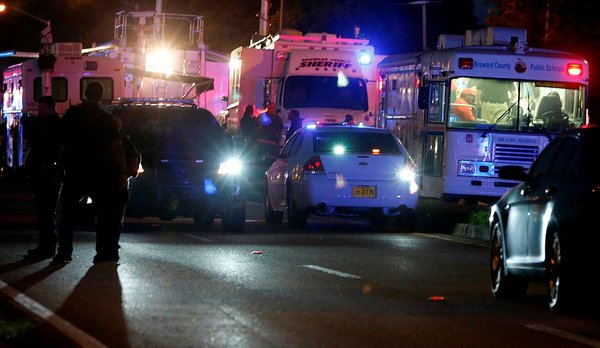
- 'EVERYONE STARTED RUNNING' -
The shooting, one of nearly 20 at a school since the start of the year, will once again throw the spotlight on the epidemic of gun violence in the United States, where there are 33,000 gun-related deaths annually.
But when questioned at a press conference late Wednesday, Florida Governor Rick Scott -- who described the massacre as "just pure evil" -- declined to make a statement on gun control in the aftermath of the shooting.
"There's a time to continue to have these conversations about how through law enforcement, how through mental illness funding that we make sure people are safe, and we'll continue to do that," said Scott, a Republican.
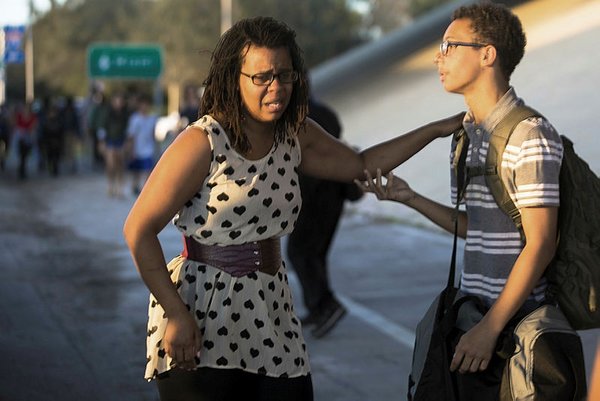
At the same briefing, Florida Attorney General Pam Bondi said the state will cover the costs of funerals and counseling for survivors.
"We will continue to work together as a team, as a family, and love and take care of all of these victims and their family members," she said.
Parkland Mayor Christine Hunschofsky told CNN she had spoken to a number of students after the shooting erupted shortly after 2:00 pm (1900 GMT).
"They were very scared," she said. "And almost in shock when they came out."
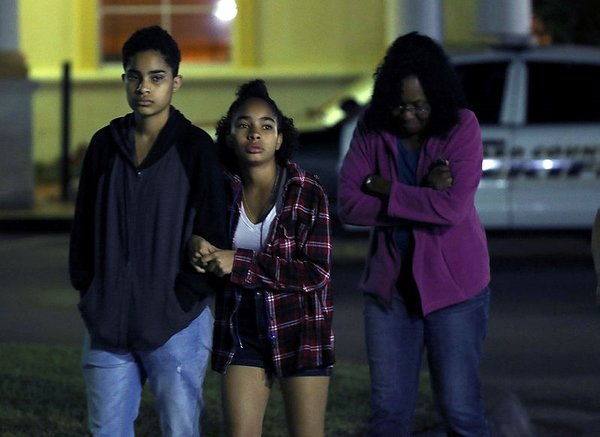
Students, some with their hands in the air, were led out of the school by heavily armed police officers and an armored vehicle filled with a SWAT team on the scene.
Student Jeiella Dodoo told CBS News that she and her schoolmates evacuated calmly after hearing what they thought was a routine fire alarm.
"The alarm went off so we had to evacuate from our classes," she said. "Then we heard gunshots.
"I heard about six gunshots," she said, "and then some people started running and then everyone started running because we were like 'If it's real, then just run.'"
Teacher Melissa Falkowski told US networks that she had helped 19 students squeeze into a closet with her.
"We were in there for probably 40 minutes. We were locked in the closet until SWAT came and got us," she told CNN.
Police officers in helmets, bulletproof vests and armed with automatic weapons could be seen stationed at several points around the sprawling school complex, which serves nearly 3,000 students.
"Just a horrible day for us," said the superintendent of the county's school district, Robert Runcie.
"This is very sad to me and our family too," 61-year-old Joseph Panikulangara, whose 17-year-old niece Dhiya attends the school, told AFP.
The FBI said it was assisting local law enforcement with the investigation.
When asked about security, Hunschofsky said a police officer is always stationed at the school and there is a "single point of entry."
- NO CHILD SHOULD 'FEEL UNSAFE' -
President Donald Trump offered his "prayers and condolences to the families of the victims."
"No child, teacher or anyone else should ever feel unsafe in an American school," he said on Twitter.
But since January 2013, there have been at least 291 school shootings across the country -- an average of about one a week, according to Everytown for Gun Safety, a non-profit group that advocates for gun control.
"It is pretty clear that we're failing our kids here," said Falkowski, the teacher who helped shield her students from harm in a closet.
- THE FLORIDA SHOOTER, A TROUBLED TEENAGER AND GUN LOVER
Nikolas Cruz, the shooter who opened fire on a Florida school Wednesday killing 17 people, was a teenage gun lover previously expelled from the school for disciplinary reasons.
The gunman, 19, showed up at the end of the school day at his former school -- Marjory Stoneman Douglas High School in Parkland -- with a semi-automatic AR-15 assault rifle and a large amount of ammunition.
Local police later arrested him in nearby Coral Springs.
Born in September 1998, Nikolas Cruz had posted "very disturbing" messages on social media, according to Broward County Sheriff Scott Israel, who did not specify their exact content.
Authorities have not released a photograph of the shooter, and an Instagram account reportedly belonging to him has been suspended.
Cruz was known at school as having problems, according to several witnesses interviewed by local media.
"There were problems with him last year threatening students, and I guess he was asked to leave campus," Jim Gard, a math teacher who had taught Cruz for a semester in 2016, told the Miami Herald.
Gard told CNN that although he had not had problems with Cruz in class, female students reported Cruz having "problems with other girls."
Meanwhile a student, who wasn't named, told local broadcaster WSVN-7 that Cruz was "a troubled kid" who had firearms at home and had talked about using them.
"He shot guns because he felt it gave him, I guess, an exhilarating feeling," the student said.
According to another pupil, Nicholas Coke, Cruz was a "loner" who left the school and moved to northern Florida following the death of his mother. He had also undertaken a junior military training program, according to Pentagon sources who did not offer details.
The shooter had already had "a lot of problems," Coke said, recalling an incident during middle school when Cruz kicked out a window.
Meanwhile another student, speaking to local channel WJXT, said "everyone predicted" Cruz would carry out such an atrocity.
"Honestly, a lot of people were saying it was gonna be him," the pupil said.
He added Cruz knew the layout of the school and had some knowledge of security procedures through participating in fire drills.
"He knows the school layout, he knows where everyone would be at as of right now," the student said.
"He's been with us in fire drills, he's prepared for this stuff."
18 SCHOOL SHOOTINGS IN US IN 2018
The deadly gun rampage at a Florida high school on Wednesday took to 18 the number of school shootings across the United States so far this year -- a phenomenon that authorities seem powerless to prevent.
The stunning number underscored how commonplace gun violence has become in America, with students in elementary and secondary schools regularly performing drills on how to react in an "active shooter" situation.
According to the independent Everytown for Gun Safety group, eight of the 18 school shooting incidents so far this year, which cover primary schools to universities, involved guns being discharged with no one injured.
Two were suicide attempts, and the rest attacks on others.
The attack on Wednesday at the Marjory Stoneman Douglas High School in Parkland, Florida -- about 50 miles (80 kilometers) north of Miami -- appeared to be the worst so far in 2018, with 17 confirmed dead by the local county sheriff.
On January 23, a 15-year-old boy opened fire with a handgun at the start of the school day at a Kentucky high school, killing two students and wounding others.
The day before, a teenager was wounded by a shot fired in her school cafeteria in Texas. The same day, a bullet grazed a 14-year-old boy in the parking lot of a New Orleans high school.
Earlier in January, shootings took place in Iowa, Washington state and California, among other places.
The frequency of the incidents has somewhat dulled their ability to shock.
The nation was stunned on December 14, 2012 when Adam Lanza, 20, shot dead 20 schoolchildren and six teachers at Sandy Hook Elementary School in Newtown, Connecticut.
Since January 2013, there have been at least 291 school shootings, according to Everytown for Gun Safety, a non-profit group that advocates for gun control.
"Are we coming to expect these mass shootings as a kind of routine matter?" Florida Senator Bill Nelson told CNN.
Each incident like the one in Parkland brings calls for more strict laws on gun sales and ownership, but gun rights campaigners regularly succeed in stifling those calls.
Indeed, laws on carrying guns in public have been made less strict in many areas.
"If more guns and fewer gun laws made us safer, we wouldn't have the highest rate of gun violence among peer nations," Shannon Watts, founder of Moms Demand Action for Gun Sense in America, said on Twitter.